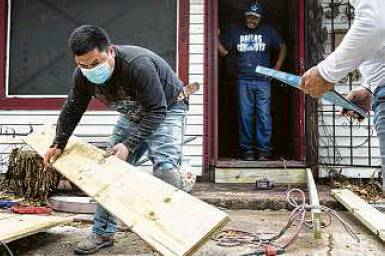How do I get disaster relief in Houston?
By Alejandro Serrano STAFF WRITER
The weather in the Houston region may be warming up, but many residents still need help dealing with damage caused by the recent frigid storm.
City and Harris County leaders said tens of thousands of area residents and business owners suffered burst water pipes or other damage from the winter storm, with the resulting property damage likely costing tens of millions of dollars.
Lawyers from Baker Botts have come together on a pro bono basis to produce a Winter Storm Uri Consumer Resource Guide that is worth checking out.
Here are some other things you can do if you need disaster relief.
What are my options?
Homeowners and renters whose homes were affected by the storm can apply for assistance from the Federal Emergency Management Agency. If you have insurance, you must file a claim with your insurance company as soon as you can. FEMA won’t duplicate benefits for losses that insurance covers. The available assistance can include grants for temporary housing, home repairs, and low-cost loans to cover uninsured property loss, according to an agency spokesperson.
The Houston Harris County Winter Storm Relief Fund plans to distribute $1.65 million in emergency grants to community groups. The grants include $1.5 million being invested in the Disaster Home Repair Collaborative, a cadre of home repair groups. Volunteers with Crisis Cleanup can also help you with minor repairs if your home was damaged.
Harris County Appraisal District officials said owners of damaged residential property are also eligible for temporary property tax relief. Properties that sustained at least 15 percent damage in a governor-declared disaster area, such as the mid-February freeze, can receive the temporary exemption.
How do I get assistance?
FEMA officials say the fastest way to apply for help is online at www.disasterassistance.gov/
If you can’t apply online, call 800-621-3362 between 6 a.m. and 10 p.m., Central time, any day of the week. People are encouraged to document damage and hold onto receipts of any expenses related to repairs.
To get information about the Houston-Harris County fund, those in need can text HoustonFreeze — or HoustonAyuda for Spanish messages — to 898211 for notifications about the program and other resources. City and county officials said people will be texted with eligibility and application guidelines. A text message Thursday said applications were not being accepted yet, but information would be distributed when available.
“The Houston area has faced one challenge after another,” Mayor Sylvester Turner said in a statement. “We cannot control the weather, but we can control our response to it.”
You can register for Crisis Cleanup by calling 844-965-1386, according to city and county officials.
Is there a deadline to apply?
For the property tax relief, owners have 105 days after the declaration of a disaster. Gov. Greg Abbott declared Harris County a disaster area on Feb. 12, which would make the deadline to file for relief May 28. The application can be found at hcad.org/
FEMA officials said deadline dates change but you should register for assistance “right now” if you sustained damages.
How do I avoid scammers?
Authorities have issued warnings about people posing as businesses or government agencies like FEMA to swindle those recovering from the storm. The Harris County Sheriff’s Office said it had received reports of people trying to repair damaged homes being asked to purchase gift cards.
“No legitimate business or government agency will require a gift card in order to make a transaction,” the office said Friday.
Police Chief Art Acevedo said you should check the license of whoever is helping you to ensure it is legitimate and never give out your Social Security number, whether it is online or via email or text or phone.
“These are just strategies to try to take your information,” he said in a video shared by the department. “Be aware. When in doubt, if it sounds too good to be true, it probably is.” alejandro.serrano@chron.com
